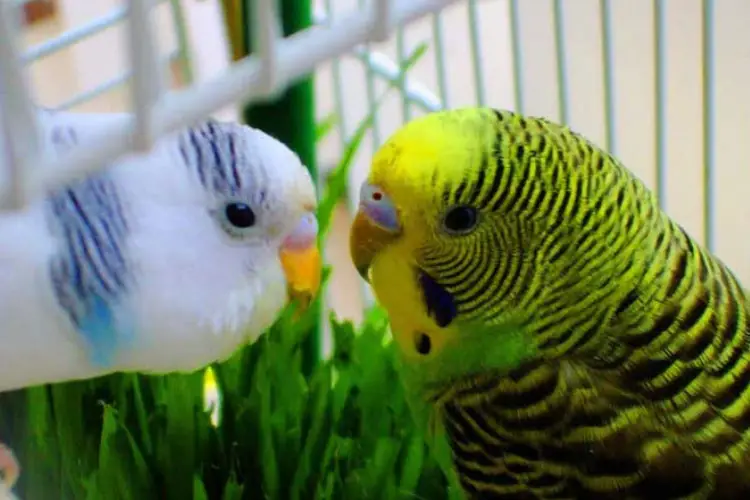Budgies are talkative, social, and love to interact. They could feel lonely if kept alone. So you probably don’t want to leave your dear pet alone and see it sad & depressed!
Do budgies need to be in pairs? Yes, a pair of budgies fare much better than a single one. The selection of a companion budgie should be based on the space in the cage and their gender. Female parakeets are highly territorial and dominating, so if you already have a female budgie, consider a male companion. Similarly, if you’ve got a male budgie and the cage has enough space, it’s better to choose a female one. But if the area is compact, you might’ve to go with another male companion.
Since providing interactive habitat for your budgie is essential, you must keep them in pairs. To know more about how to keep your parakeet happy with a companion, check out the article here.
Why Do Budgies Need to Be in Pairs
You can’t be by your budgie all the time. Since we’ve got a lot of work to do all day, it’s hard to interact with the budgie as much as it should be done. Imagine how they live their life in the wild. A budgie often lives as a part of a large flock. They raise chicks, squabble, and groom each other regularly.
It makes them feel safe and stress-free, which translates into flourishing health. When you have a pet budgie, you definitely want it to be happy and live life naturally. The best way to be natural for them is to bond with their own kind.
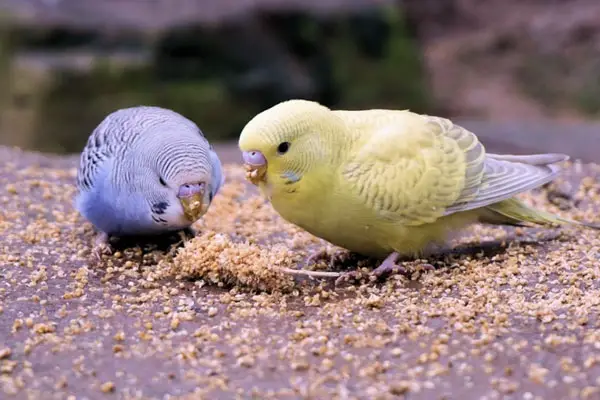
Many wonders keeping budgies in a pair will mean you’ll get less attention as they’ll devote more attention to each other. But training them before putting them together can solve the issue. You’ll find enough affection from them that can make you happy as an owner.
But you’ve to consider a few things if you’re supposed to keep your parakeets in pairs, such as
- Getting a giant bird cage
- Making a good combination based on their gender
- Providing adequate food arrangements
- Ensuring a healthy and playful environment, and so on.
We’ll find out more about these things later, but for now, you can be sure about one thing is that don’t leave your budgie single unless you want to see it getting depressed and unhappy.
What Genders of Budgies Get Along Best
We already said hens are more dominating and territorial (learn more about this behavior here). So you should avoid putting two female parakeets together. On the other hand, if you already have a male budgie, you can pair it with a male or a female companion. Males are friendlier and more social, and you’ll hardly find them fighting.
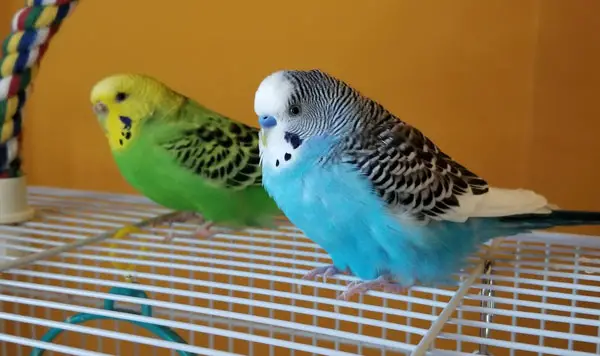
But if you’re looking to pair a male budgie with a female one, there are a few things you need to consider.
- You’ll need to have enough space so they don’t fight over.
- There’ll be a chance that they’ll breed and give birth to chicks. So you’ve to be prepared to handle the lucky clutch of eggs and the chicks that can be produced.
You can consult a vet to ensure the female budgie doesn’t have any complications while laying eggs, and the chick that hatch can be in good health. But if you’re not prepared to welcome some chicks at the moment, pairing budgies of the same sex is a better idea for you.
How To Train & Introduce The Budgies With Each Other?
Before introducing the new companion to your budgie, take some precautionary steps.
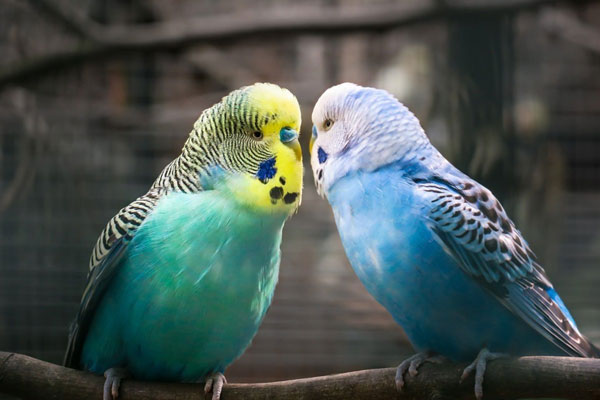
- Firstly make sure the new budgie is healthy by visiting the vet.
- Once you’ve got the clean bill from the vet, manage a separate cage for the new member where you can give them the primary grooming. This period of quarantine can help the training process see why quarantine is important while introducing a new bird).
- Place the existing budgies cage and new cage next to each other. It’ll help them to get familiar with each other and the conditions.
- After a few days, they should be ready to get along. So you can get the new budgie to pay a visit to the old cage with the existing budgie. Get them used to with a few visits like this. Once they enjoy themselves, you can permanently shift the new budgie with your existing budgie.
- This gradual training will also ensure that both parakeets have a personal relationship with you as an owner.
Also read: Pregnant Dead Budgie
Provide Safe Housing, Food, and a Playful Environment
Buy the largest cage possible to keep your couple budgies so they can move comfortably around. Parakeets tend to fly back and forth, so you’ll need a cage with more length than their height. The cage’s bar spacing should be ¼ inch so they can climb around easily and not get stuck in the bars. Don’t use bamboo cages as they can chew through them.
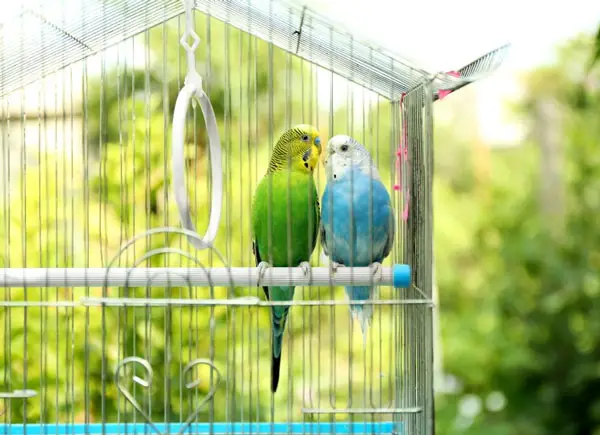
To ensure they eat conveniently:
- Put two bird food cups and water dishes.
- Give them a balanced diet in adequate amounts.
- Clean the food stations and the cage properly with newspaper or plain paper towels.
- Provide a minimum of two bird-safe toys. It’ll help enrich the environment so your couple parakeets can amuse themselves. Budgies love mirrors, especially the budgie boy who serenades his image and taps the beaks to the reflection to enjoy it for hours.
What Are the Disadvantages of Keeping Budgies in a Pair
There are a few disadvantages of keeping budgies in pairs, but most of them could be quickly dealt with.
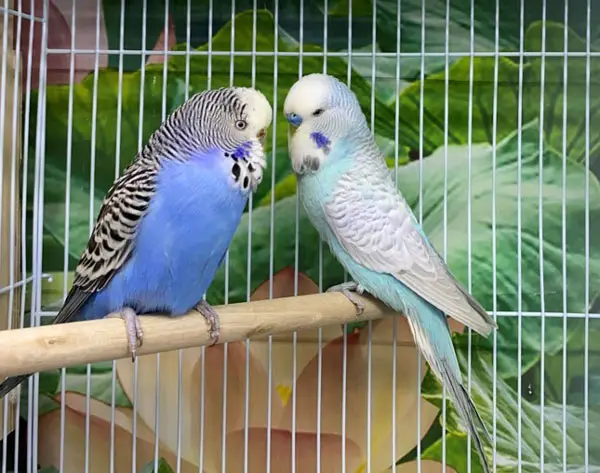
- Since they have fragile health, you’ve to take more care of a parakeet pair than a single parakeet. You’ve to supply adequate food, keep their environment clean and playful, and make sure they don’t fight.
- Keeping budgies of opposite sexes poses the chance of breeding even when you aren’t ready.
- A paired budgie might devote their attention to each other. So you might get less attention than you would’ve expected.
FAQs
If you’re still left with queries, here are some FAQs answered below.
Budgies become very close to their mates, so when a friend dies, they’re often seen to mourn and grief. They can even become depressed and stop living everyday life. If the companion dies, you must take the budgie to the vet to see if their health is fine. Also, try introducing it to new mates and enrich the environment as much as possible.
After a few training days, the two budgies can bond within one week of staying together in one cage.
Related: Budgie Tail Bobbing
Final Words
Since budgies are friendly birds, they make the best-feathered friends for any pet lover. But every animal loves the companionship of its own kind. And for social birds like budgies, you can’t risk them leaving alone, especially if you’re someone with a hectic daily schedule.
You might get less attention than before, but you don’t mind seeing a beautiful pair of playful budgies. A little bit of extra care can keep the pair of birds happy. And when you pass through some beautiful moments with your happy pair of budgies, all your extra effort will seem worth it.
